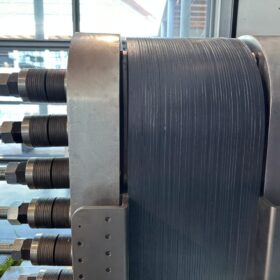European Hydrogen Bank Awards €992 Million in Subsidies to Renewable Hydrogen Projects
Key Ideas
- The European Hydrogen Bank (EHB) allocated €992 million in subsidies to 15 renewable hydrogen projects in the EEA, aiming to promote green hydrogen production.
- Feed-in premium tariffs for the selected projects ranged from €0.20/kg to €1.88/kg, sparking debates on project viability despite being oversubscribed four times.
- EU's binding quotas for green hydrogen usage from 2030 incentivize low bids, but the feasibility of achieving cost parity with grey hydrogen remains uncertain.
- Developers are urged to secure off-takers willing to pay a premium for green hydrogen, with concerns about project financing and the likelihood of all projects materializing by 2030.
The European Hydrogen Bank (EHB) recently concluded its second green hydrogen auction, awarding €992 million in subsidies to 15 renewable hydrogen production projects across the European Economic Area (EEA). Despite securing feed-in premium tariffs between €0.20/kg to €1.88/kg, concerns arose about the viability of the projects as the tariff levels were considered low compared to the current market price of hydrogen in Europe, which exceeds €5/kg. The auction attracted 61 bids from 11 countries, totaling €4.88 billion in requests, indicating high interest in green hydrogen projects. However, industry analysts like Mark Thomton and Martin Tengler expressed uncertainties about achieving cost parity with grey hydrogen and the challenges developers face in securing off-takers to pay a premium for green hydrogen.
The European Commission's implementation of binding quotas for green hydrogen usage by 2030, known as RED III quotas, played a significant role in encouraging low bids during the auction. These quotas make buyers more willing to purchase green hydrogen and aim to ensure that 42% of Europe's hydrogen comes from green sources by 2030. Despite the positive outlook, concerns remain about the feasibility of selected projects meeting their targets and securing project financing. Additionally, limitations on subsidy stacking and the need for off-takers willing to pay a premium pose challenges for developers, raising doubts about the successful implementation of all awarded projects by 2030.
While the auctions successfully incentivize green hydrogen production and sales, uncertainties persist regarding the projects' feasibility and the likelihood of achieving cost parity with grey hydrogen. The energy sector's transition towards renewable energy sources and the importance of project execution experience and supply chain maturity are highlighted as key factors affecting the success of green hydrogen projects in the European market.
Topics
Projects
Green Energy
Renewable Projects
Subsidies
European Union
European Commission
Auctions
Market Conditions
Project Financing
Latest News
